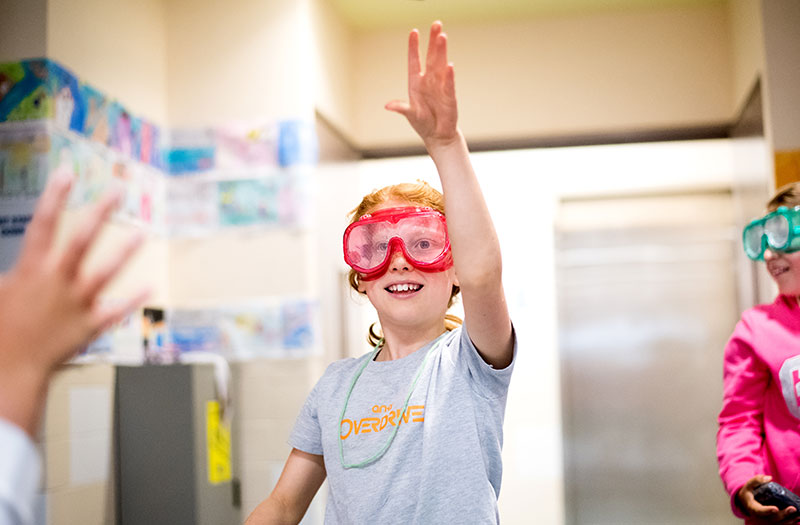SEP’s high school programs are only open to students from SFUSD or SF charter schools
The Cellular Construction Workshop is a 10-day summer workshop for high school teachers and students. This NSF-funded program, as part of the Center for Cellular Construction, engages students and teachers in design challenges as they learn together about the field of cellular engineering.
Have you heard of cellular engineering? Cellular engineering is a field of biology that uses cells to solve complex problems. It applies what we know about cells, including how they’re built, make decisions, and accomplish tasks, to develop new technology based on this knowledge. We need a new generation of scientists to help us tinker, build, and figure out how things work so that we can use cellular engineering to make the world a better place — that’s why we need you!
The Cellular Construction Workshop (CCW) is a paid 10-day long summer program where high school students and teachers work together to learn about the field of cellular engineering. Students and teachers collaborate in teams to conduct experiments to observe how cells work, use robots and coding to copy how cells make decisions, and try to solve a real-world problem using what they’ve learned about cells and coding. No coding or robotics knowledge is necessary!
Browse the workshop materials (lesson ideas, worksheets, and more) to bring cellular engineering into your classroom!
Students:
Teachers:
We aren’t necessarily looking for students who have the best grades or have accomplished the most. In fact, we don’t ask you for your grades or GPA as part of your application. The ideal candidate will show us:
See our FAQ tab for more details on eligibility.
2025 Application Process
Expectations:
The CCW is a unique program because it is open to both students and teachers. They will work together in teams throughout the workshop.
Students: Current 10th or 11th graders who go to high school in San Francisco Unified School District, or a SF Charter school.
Teachers: Must teach a STEM subject at a public school or public charter school in one of the following school districts: San Francisco Unified School District, South San Francisco Unified School District, Jefferson Union High School District, Oakland Unified School District, Hayward Unified School District, or West Contra Costa Unified School District.
Student applications are due: Sunday, March 2, 2025 by 11:59 pm. Teacher applications are due by Sunday, March 9, 2025 by 11:59 pm.
The CCW program begins Friday, June 13th 2025 and runs through Friday, June 27th 2025, 9am – 3pm, M-F daily. There will be no workshop on June 19th in observance of Juneteenth. The CCW takes place at the UCSF Mission Bay campus.
Teachers will receive parking validation.
Students if you would like to see a sample application with types of questions we ask please click here (please note this not the application you turn in, you must use the online application form link).
Teacher and student applications will be submitted online.
Students: You will need select an adult that you have worked with at school, at work, in an afterschool activity etc. to submit a letter of recommendation online on your behalf. You will need to include the recommender’s name in your application and then you will need to sent them this link (tfaforms.com/5100430) and invite them to submit a recommendation on your behalf. Give your recommender(s) this document, which includes instructions for what to submit and how to submit it.
We read every application very carefully and use each component of the application to inform our decision. Through the application, tell us about why we should select you. We don’t use grades or academic achievement as an indicator of potential success in this program. Instead, we want to know that you have some interest in science or engineering and that this program could help make a difference in your life.
The ideal candidate will show us:
We accept 12-15 students and 4-5 teachers. We don’t conduct interviews.
We will notify students and teachers via email by April 4, 2025.
No, coding knowledge is not necessary. We do recommend that students have taken at least one biology class in high school.
As long as your other summer programs don’t interfere with the timing of the CCW, you can participate in other summer programs.
All of SEP’s programs are offered free-of-charge. To do this work, SEP must annually raise nearly $2 million. Every donation brings us closer to that goal and helps to make this important work possible.

As part of UCSF, SEP is a 501(c)3 non-profit. All donations are tax deductible to the fullest extent of the law. Please let us know if your company participates in a matching gift program so that we can extend the benefit of your generosity.